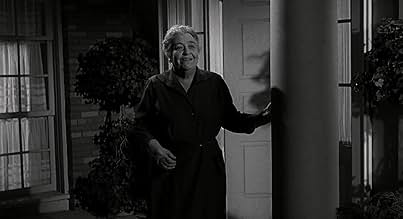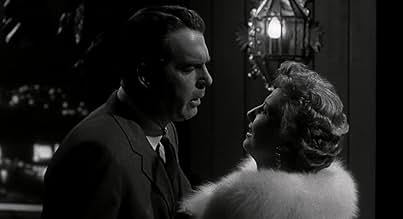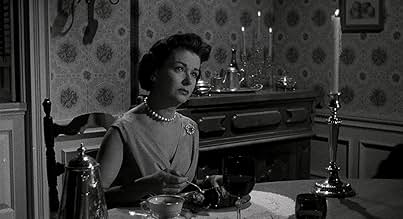अपनी भाषा में प्लॉट जोड़ेंWhen a toy manufacturer feels ignored and unappreciated by his wife and children, he begins to rekindle a past love when a former employee comes back into his life.When a toy manufacturer feels ignored and unappreciated by his wife and children, he begins to rekindle a past love when a former employee comes back into his life.When a toy manufacturer feels ignored and unappreciated by his wife and children, he begins to rekindle a past love when a former employee comes back into his life.
- निर्देशक
- लेखक
- स्टार
फ़ीचर्ड समीक्षाएं
MacMurray is a successful toy developer, Clifford Groves, married to Marion (Bennett), and they have three children (Reynolds, Perreau, and Nugent). Marion is preoccupied with the kids and the household, while MacMurray is longing for some alone time with her and to do something different - take a weekend off, go to the theater -- but something always happens that prevents it.
When Marion can't make a theater performance because of their daughter's dance recital, Cliff stays home alone. A woman who once worked for him, Norma Vale (Stanwyck) comes over to say hello. She's now a successful dress designer in from New York. He takes her to the theater instead, and then she asks to see his office.
When a planned weekend in the desert with Marion doesn't work out because one of the girls breaks her ankle, Marion insists that Clifford go without her and relax. There, he runs into Norma again. Unfortunately, his son (Reynolds) shows up and thinks Cliff and Norma are involved. He and his friends leave without making their presence known to his dad. Without realizing what's happening, Cliff is falling for Norma; and he doesn't know that she's always been in love with him.
This is a midlife crisis, '50s style, with the underpinning of the grass is always greener. That wasn't the original intention, of course - the original intention of the film is that Norma is lonely and would give up her wonderful career to have a family like Marion and Cliff have. People still feel this way, but today, it's more because of the road not taken, not so much because of dissatisfaction. Nothing's perfect, as the film shows us. Cliff sees Norma's freedom, the attention she pays him, her interest in his work. He feels in fourth place behind the kids to Marion. He's sick of being like the robot that is his latest toy. You wind him up, he works, he comes home, he has dinner, he goes to bed. With Norma he sees an opportunity for something different. Youth. To be put first. Endless possibility.
What a lovely movie, and I thought I was sitting down to some second feature. Instead, it has Sirk's magic touch and his sly criticism of the picture-perfect '50s American life. Frankly, I could have slapped the kids and Marion for not seeing what's in front of their faces, but to be fair, kids are self-involved, and Marion is completely committed to doing what she thinks is important for Cliff and their family.
Wonderful acting, with MacMurray as the frustrated Everyman, Bennett as an attractive, disciplined woman, and Stanwyck has someone who has earned wisdom the hard way, through hard work and disappointment.
Highly recommended.
Just as he's feeling especially insignificant along comes old flame Barbara Stanwyck in her third fine film with MacMurray to fan the sparks of his mid-life crisis into a full-blown blazing passion, to the extent where he has a secret if accidental weekend away with her and quickly comes to contemplate leaving his family for a life of excitement with her. Which way will he turn and what part will his two mortified older children, who in typical Sirkian grand coincidental fashion, learn of his plans, play in his final decision?
Once again, Sirk brings family members to a crisis-point and even if the resolution this time takes a conventional course, still there's real drama in these excellently crafted and written scenes of anything but cosy domesticity. Cynics may make sneering remarks about all this amounting to shallow soap operatics but I think they would be wrong. Post-War Western and especially American society was evolving even against the "I Like Ike" background of greater personal wealth and the growth in consumerism but just under the surface it wasn't all sweetness and light and Sirk was one director who caught that change in attitudes in his mid-50's work.
Once again MacMurray surprised me with the depth and roundedness of his performance as a middle-aged man cornered by society's expectations of him while Stanwyck in one of her last major roles before she, like MacMurray a bit later, turned to TV, is as good as she usually is as the unwitting Eve in Fred's supposed Garden of Eden. Her character of a flamboyant, self-confident, but importantly unmarried career-woman is equally worthy of deeper investigation as MacMurray's worm-turning Mr Suburbia.
Lesser known than other Sirk dramas of the decade it's as good as any of them in my opinion and well worth watching.
The best part here is that "There's Always Tomorrow" has director Douglas Sirk working in the 1950s, with his best photographer Russell Metty. This means artful shadows, stairways, windows and reflections. Such visuals, especially as they complement the story, are great. There is even a scene with Stanwyck's face shedding tears that are actually reflected raindrops; a technique said to have originated with "In Cold Blood" (1967). Quite possibly, this was done even earlier...
The cast is strangely unimpassioned. MacMurray and Stanwyck lack the level of spark they conveyed in previous collaborations. Perhaps this is the point. MacMurray has become like the toy robot he created. He's "Rex" the walkie-talkie mechanical man. Stanwyck appears to be hesitating an attempted seduction. While not the protagonist, she becomes the most interesting character. Completely and most maddeningly in the dark, Ms. Bennett acts robotically unaware of the threat to her supposedly perfect family life. Shaking things up is suspicious and literate son William Reynolds (as Vinnie).
******* There's Always Tomorrow (1/20/56) Douglas Sirk ~ Fred MacMurray, Barbara Stanwyck, Joan Bennett, William Reynolds
क्या आपको पता है
- ट्रिवियाAcclaimed documentary filmmaker Errol Morris named it as one of his 10 favorite films in the 2002 BFI Sight & Sound Poll.
- गूफ़Near the end, Vinnie is telling his girlfriend that he was wrong "about Norma and Cliff" in these exact words. But Cliff is his father; he wouldn't refer to his father by his first name.
- भाव
Norma Miller Vale: Love is a very reckless thing. Maybe it isn't even a good thing. When you're young and in love, nothing matters except your own satisfaction. The tragic thing about growing older is that you can't be quite as reckless anymore.
- साउंडट्रैकBlue Moon
(uncredited)
Written by Richard Rodgers and Lorenz Hart
Played on one of the toys and heard as a theme throughout the film
टॉप पसंद
- How long is There's Always Tomorrow?Alexa द्वारा संचालित
विवरण
- रिलीज़ की तारीख़
- कंट्री ऑफ़ ओरिजिन
- भाषा
- इस रूप में भी जाना जाता है
- Pasión otoñal
- फ़िल्माने की जगहें
- उत्पादन कंपनी
- IMDbPro पर और कंपनी क्रेडिट देखें
- चलने की अवधि1 घंटा 24 मिनट
- रंग
- पक्ष अनुपात
- 1.85 : 1
इस पेज में योगदान दें




































